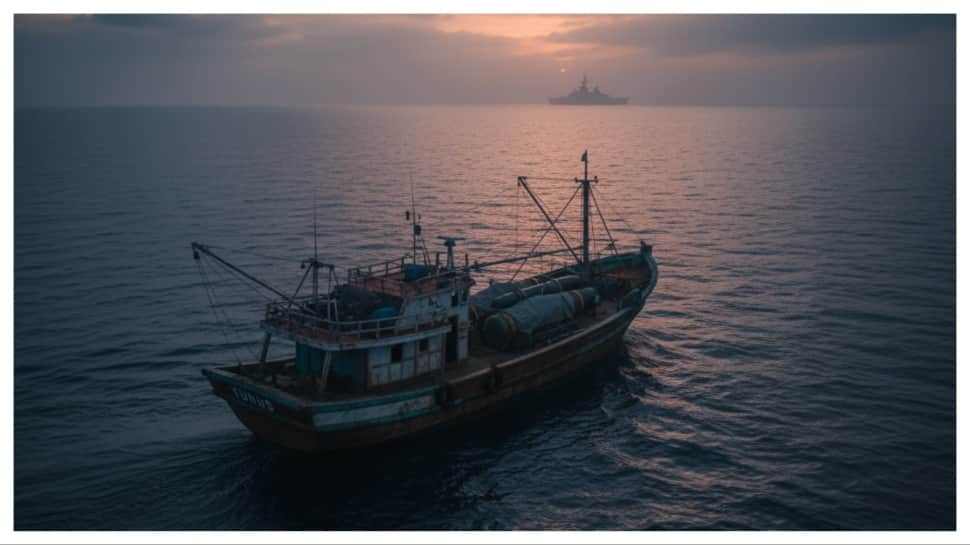Muhammad Pahlawan, a 49-year-old Pakistani arms trafficker, has been sentenced to 40 years in a US prison after being convicted on multiple serious charges related to a high-stakes international weapons-smuggling operation. His criminal enterprise aimed to arm Houthi militants in Yemen with ballistic missile components supplied by Iran, a move that could have drastically shifted the balance of power in the volatile Middle East region. The case not only exposed the dangerous intricacies of global arms trafficking but also highlighted the extreme risks undertaken by those trying to prevent such deadly cargo from reaching terrorist hands.
At the heart of Pahlawan’s smuggling operation was a deceptively simple yet highly effective strategy: using seemingly innocent fishing vessels to disguise and transport Iran’s most advanced ballistic missile parts. The fishing boat named Yunus served as the primary vehicle for this covert mission. According to the US prosecution and authorities involved, the crew aboard the Yunus posed as fishermen, but they were reportedly misled and unaware of the true nature of their cargo. They had loaded large, secretive packages at the port of Chabahar, Iran, destined ultimately for Yemen, where the Houthi militants control significant territory.
What looked like a routine fishing expedition across the Arabian Sea was, in reality, a crucial link in a weapons pipeline that could have provided the Houthis with the capability to launch ballistic missile strikes across the Middle East. This smuggling operation threatened to empower one of the world’s most dangerous terrorist groups with destructive firepower, potentially exacerbating conflicts in the region and destabilizing already fragile geopolitical dynamics.
The US military intervened decisively in January 2024 during a covert operation in the Arabian Sea, aiming to intercept and prevent the delivery of this lethal cargo. Tragically, the mission came at a high cost: two US Navy SEALs lost their lives during the operation. These fallen American servicemen made the ultimate sacrifice to halt the shipment of missile components that could have been used in attacks against civilian targets, including cities in Israel that had recently endured relentless missile and drone strikes by Houthi forces, who expressed solidarity with Gaza amid ongoing conflicts.
Pahlawan’s capture and subsequent trial unveiled chilling insights into the perilous world of arms trafficking. Throughout the legal proceedings, prosecutors presented evidence and communications that revealed the personal toll and inherent dangers associated with such illicit activities. In private text messages to his wife, Pahlawan described himself as a “walking dead person,” a stark admission reflecting his awareness of the grave risks he faced. Despite knowing the catastrophic consequences of facilitating the transfer of weapons to terrorist organizations, Pahlawan pursued the operation for financial gain.
His role in this smuggling network earned him approximately 1.4 billion Iranian rials—equivalent to about $33,274. The operation was part of a larger scheme orchestrated by Iranian siblings Yunus and Shahab Mir’kazei, who are alleged to have ties with the Islamic Revolutionary Guard Corps (IRGC), a powerful branch of Iran’s military known for supporting proxy groups across the Middle East. For just over $33,000, Pahlawan was willing to equip terrorists with weapons of mass destruction, demonstrating the low costs and high stakes involved in such illicit dealings.
This was not Pahlawan’s first involvement in arms smuggling. Prior to his arrest, he had successfully carried out two similar missions, recruiting a dozen men from Pakistan under the pretense of legitimate fishing employment. These recruits were unaware of their true involvement in an international arms trafficking operation. Believing they were simply taking up fishing jobs, they unwittingly became part of a dangerous supply chain that threatened regional and international security.
Pahlawan’s conviction included charges of terrorism and the transportation of weapons of mass destruction. The US court handed down a 40-year prison sentence, ensuring that he will spend decades behind bars as accountability for his actions. This verdict underscores the severity with which the US judiciary views attempts to arm terrorist organizations, particularly those that could alter the geopolitical landscape and threaten innocent lives.
The operation against Pahlawan and his network highlights broader regional tensions, especially the ongoing conflict involving the Houthis in Yemen and their missile and drone attacks on Israel. The Houthis’ increased attacks were seen as acts of solidarity with Gaza during a period of heightened violence, raising concerns about the proliferation of advanced weaponry in the region and the potential escalation of conflict.
The case also sheds light on the sophisticated methods used by traffickers to

